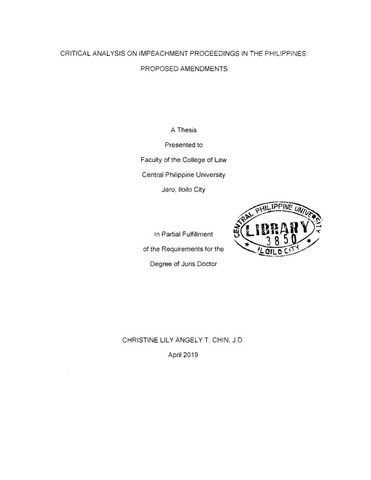Ipakita ang simpleng tala ng item
Critical analysis on impeachment proceedings in the Philippines: Proposed amendments
| dc.contributor.adviser | Alibogha, Salex E. | |
| dc.contributor.author | Chin, Christine Lily Angely T. | |
| dc.coverage.spatial | Philippines | en_US |
| dc.date.accessioned | 2021-06-29T03:01:32Z | |
| dc.date.available | 2021-06-29T03:01:32Z | |
| dc.date.issued | 2019 | |
| dc.identifier.citation | Chin, C. L. A. T. (2019). Critical analysis on impeachment proceedings in the Philippines: Proposed amendments (Unpublished postgraduate thesis). Central Philippine University, Jaro, Iloilo City. | en_US |
| dc.identifier.uri | https://hdl.handle.net/20.500.12852/1113 | |
| dc.description | Abstract only | en_US |
| dc.description.abstract | Impeachment proceedings which are supposed to be an abstract activity are no longer valid because of the practical implications that go with it. The proceedings are not lodged in traditional institutions of law but are conducted by elected representatives of the people. This study was conducted to critically analyze impeachment proceedings in the Philippines and to propose amendments. The data were gathered from Article 11 Sections 2 and 3 of the 1987 Philippine Constitution, through a critical analysis of its provisions that determined the nature and functions of impeachment proceedings. After a critical review of the provisions, other data were gathered from Rules of Procedure in Impeachment Proceedings, news articles from the internet, newspapers, and case studies of previous impeachment complaints filed in the Philippines that pinpointed existing problems in the impeachment process. A Qualitative research method was used in this study. The specific type of research design that was used was Historical Research. This study concluded that impeachment is entirely dependent on politics more than the constitutional structure that determines the success or failure of any effort to remove the public official. Being sui generis in character is the fact that the Senate, as the body with sole authority to try and decide cases of this nature, is not part of the judiciary and functions independently of judicial institutions. It stands alone on matters such as appreciation of evidence and, how much evidence is needed to convict or acquit. Impeachment Proceeding being a judicialized proceeding is nowhere better to be lodged than in the Supreme Court. The proposed impeachment court will be constituted by 3 Justices coming from the Supreme Court and selected by a manner of raffling. A certain number of Justices will only be chosen as to not paralyze the everyday functions of the Supreme Court while the impeachment proceeding is ongoing. | en_US |
| dc.format.extent | vii, 50 leaves | en_US |
| dc.language.iso | en | en_US |
| dc.rights | Attribution-NonCommercial-NoDerivs 3.0 Philippines | * |
| dc.rights.uri | http://creativecommons.org/licenses/by-nc-nd/3.0/ph/ | * |
| dc.subject.ddc | Law Library 340.72 C441 2019 | en_US |
| dc.subject.lcsh | Trials (Impeachment) | en_US |
| dc.subject.lcsh | Impeachment | en_US |
| dc.subject.lcsh | Impeachments | en_US |
| dc.subject.lcsh | Philippines | en_US |
| dc.subject.lcsh | Constitution (Philippines : 1987) | en_US |
| dc.title | Critical analysis on impeachment proceedings in the Philippines: Proposed amendments | en_US |
| dc.type | Thesis | en_US |
| dc.description.bibliographicalreferences | Includes bibliographical references | en_US |
| dc.contributor.chair | Bedona, Zacarias D. Jr. | |
| dc.contributor.department | College of Law | en_US |
| dc.description.degree | Juris Doctor | en_US |
Mga file sa item na ito
Lumilitaw ang item na ito sa mga sumusunod na (mga) Koleksyon
-
Juris Doctor [144]



